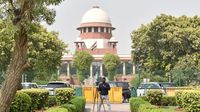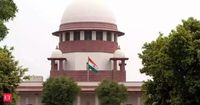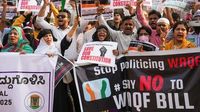The Supreme Court of India is currently deliberating on the contentious Waqf (Amendment) Act, 2025, which has sparked significant public unrest and legal challenges. During a hearing on April 16, 2025, the court expressed serious concerns regarding the violent protests that erupted following the enactment of the law, particularly in West Bengal's Murshidabad, where clashes led to arson and riot-like conditions.
Chief Justice Sanjiv Khanna, alongside Justices Sanjay Kumar and K V Viswanathan, highlighted the disturbing nature of the violence, stating, "One thing is very disturbing is the violence that is taking place. If the matter is pending here it should not happen." The court's remarks came as it considered multiple petitions challenging the constitutional validity of the Waqf (Amendment) Act.
In a notable exchange, the court raised questions about the composition of Waqf boards, which, as per the amended provisions, would include non-Muslim members. Chief Justice Khanna asked Solicitor General Tushar Mehta, "Are you saying that from now on you will allow Muslims to be part of Hindu endowment boards? Say it openly." This inquiry reflects the court's push for parity in religious representation across different trust boards.
The Waqf (Amendment) Act, passed by the Lok Sabha on April 3, 2025, and the Rajya Sabha on April 4, 2025, has been met with fierce opposition. The Lok Sabha saw 288 votes in favor and 232 against, while the Rajya Sabha recorded 128 votes for and 95 against the legislation. Critics, including advocate Hari Shankar Jain, argue that certain provisions of the Act enable Waqf boards to "illegally amass immovable properties" across India. Jain's petitions challenge six specific sections of the Act, asserting they facilitate unlawful claims on lands belonging to public utilities and Hindu temples.
During the proceedings, the Supreme Court proposed an order that properties declared as waqf, including those categorized as "waqf by user," should not be de-notified while the matter is under consideration. However, the Centre opposed this suggestion, requesting a formal hearing before any such directive could be issued.
Jain, who has been involved in high-profile cases concerning religious sites, urged the court to scrap multiple provisions of the Waqf Act, 1995, and its recent amendments. He contended that these laws have been exploited by Waqf boards to seize land unlawfully. Representing Jain, advocate Vishnu Shankar Jain requested that the court hear this petition alongside others challenging the amendments, including those from various political and religious leaders, such as AIMIM president Asaduddin Owaisi and RJD MP Manoj Kumar Jha.
The court's deliberations also touched upon the historical context of waqf properties. Chief Justice Khanna noted, "When a public trust is declared Waqf 100 or 200 years ago... suddenly you say it is being taken over by the Waqf Board. You cannot rewrite the past!" This statement underscores the complexities involved in re-evaluating historical claims made under the Waqf Act.
Furthermore, the court addressed the practical implications of undoing waqf by user, with Chief Justice Khanna expressing concerns about old mosques lacking registered sale deeds. He remarked, "How will you register such waqfs by user? What documents will they have?" This highlights the potential challenges in reversing long-established waqf claims.
As the hearing continues, the Supreme Court has directed that properties declared as waqf by courts, whether through waqf by user or waqf by deed, should remain untouched while the legal proceedings unfold. The court has also temporarily halted the application of a key provision in the amended Act, which stated that a property would not be treated as waqf while the District Collector investigates whether it is government land.
Senior advocate Kapil Sibal, representing the Jamiat Ulama-i-Hind, raised additional concerns regarding the powers granted to Collectors under the new Waqf Act. Sibal questioned the constitutionality of allowing a government official to decide the status of waqf properties, arguing that this creates a conflict of interest.
The Supreme Court is set to reconvene on April 17, 2025, at 2 PM to continue its examination of the Waqf (Amendment) Act. As the legal landscape around this contentious issue evolves, the implications for religious trust governance and property rights in India remain significant.







